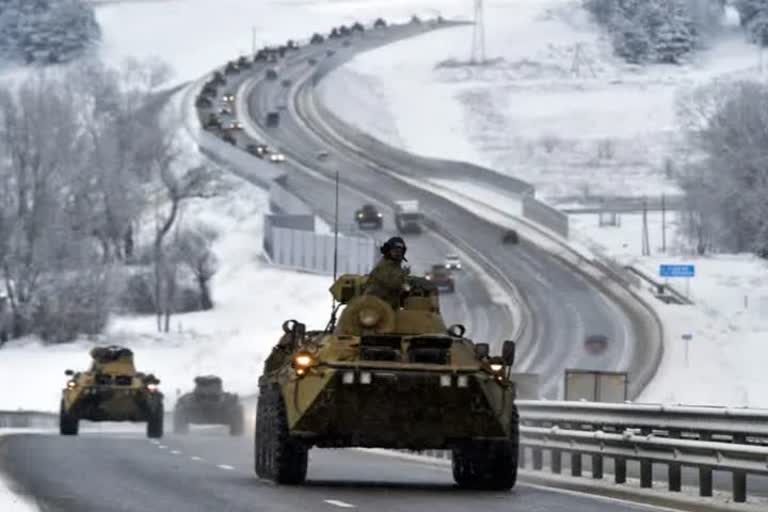New Delhi: In what is being seen as India’s first official statement on the Ukraine crisis, India on Friday called for a peaceful resolution of the crisis through diplomatic talks to ensure long-term peace and stability in the region and beyond.
At a time when the West is watching Russia’s military actions at the Ukraine-Russia and at Ukraine-Belarus border whereby assuming a possible invasion of Ukraine by Russia, India has had maintained a silence on the issue. Now, after the official statement from MEA, the one thing that has become crystal clear is that India would certainly not pinpoint or make many categorical statements, maintaining a neutral foreign policy keeping in mind its strategic interests and national security as pointed out by experts.
Talking to ETV Bharat, Former Ambassador Anil Trigunayat highlighted that “it was an expected statement since it’s a critical issue. We have strong bilateral relations with Russia, the US and even with Ukraine. But our relations with Russia are different and much more important.”
India has maintained very strong bilateral relations with Moscow in defence, trade, education and other strategic sectors with 60% of India’s military supplies come directly from Russia for the past several decades. In this context, New Delhi would certainly not want to upset its relations with Moscow at a time when India’s arch-rival China has been in direct confrontation with New Delhi in Ladakh and even in the North-East.
On January 19, US Deputy Secretary of State Wendy Sherman called up Foreign Secretary Harsh Vardhan Shringla and the two discussed “Russia’s concerning military build-up on Ukraine’s borders”. But with key strategic allies on both sides, India cannot afford any hurried expeditious move which could impact its strategic alliances which could potentially threaten its national security interests.
Also read: Ukraine Crisis: India supports peaceful resolution for peace in the region and beyond
When Russia annexed the Crimean Peninsula in 2014, following which the West had accused Russia of attacking Ukraine’s sovereignty, India qualified it as “legitimate Russian interests.”
What would happen if Russia invades Ukraine or indulges itself in a small incursion?
As per estimates, there are around 18,000 Indian students in Kyiv in 2020 but it is being predicted that these numbers may have decreased after the spread of the covid-19. The Indian Embassy in Kyiv has started collating information on the students, as part of preparations for any possible hostilities.
Other than this, Amb Trigunayat added that the possibility of a full-blown war is minimal and even if a small incursion happens by Russia, then it will create major problems for India. In that case, Russia would be put under economic sanctions, and a lot of bilateral projects would be affected. With this development, India would be in a direct confrontation with the US which India does not want for its obvious strategic interests.
As India has been allying with several countries to counter the threat of China’s dominating expansionism in the Indo-Pacific and in other areas, any such development is likely to hamper such strategies whereby it would be putting Beijing to a strong position.
Three is also a prediction that the crisis in Ukraine could alter the dynamics of Geopolitics, and this could distract the United States focus on countering China’s threat in the Indo-pacific, South China sea or even along the Indo-China border, where China and India have been at direct loggerheads since 2020.
Also read: US orders 8,500 troops on heightened alert amid Russia-Ukraine standoff
Ukrainian crisis and its impact on Geopolitics
Talking on this issue, Dr Swaran Singh, professor for diplomacy and disarmament at the Centre for International Politics, Organisation and Disarmament (CIPOD) in the School of International Studies at the Jawaharlal Nehru University, said, “Historically India’s Foreign Policy has had always opposed any military solution to an interstate dispute. Therefore, the statement from MEA on Friday is just a reiteration of that.”
India’s Foreign Policy has maintained its non-alignment stance but after the collapse of the Soviet Union, our foreign policy shifted from being non-alignment to multi-alignment for various reasons such as development, trade, strategic interests, etc., Prof Singh opined. "Russian President Vladimir Putin has been at the helm of all important affairs since 2000 and he knows the vulnerabilities of Europe. Since 2000, he has been in touch with various European leaders and he understands the internal political strife’s within the EU that could be exploited in this particular context. In the past 20 years, Putin has been cultivating these European leaders as friends and post-retirement many of these West leaders are being given cushy positions in Russian oil companies," emphasised Prof Singh.
The split within the EU is clear and that is why many of its actors seem incompetent to deal with his crisis where only French President Emmanuel Macron seems stable.
While the United States and NATO have been consistently making statements that the war is real and imminent, the statement from the Ukrainian side also tells us that while the threat seems real the war, in any case, is not imminent.
Ukrainian President Zelenskyy on Friday addressing in a media conference said “I don’t consider the situation now tenser than before. There is a feeling abroad that there is war here. That’s not the case.”
Reacting to this statement, Prof Singh highlighted that “attempts made by the US or the West are partly driven to erase the memory of Afghanistan". He further added that as US President Joe Biden’s popularity has been declining tremendously, and to ease these tensions off, a narrative is being produced that the West would not allow any incursion on the Ukraine soil by Moscow and this is an attempt by the US to portray that they’re still the world power or the major power.



